Showing 1-19 of 19 results
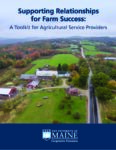
Supporting Relationships for Farm Success
It is not uncommon that the barriers to implementing changes on the farm are not related to production or marketing but rather interpersonal or "non-technical" issues like effective communication, decision-making, goal setting and time management. This toolkit was created by Dr. Leslie Forstadt, University of Maine Cooperative Extension, and Abby Sadauckas, Apple Creek Farm, as […]
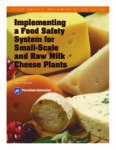
Implementing a Food Safety System for Small-Scale and Raw Milk Cheese Plants
The purpose of this guide is to assist small-scale and raw milk cheesemakers in conducting Hazard Analyses of their processes to ensure they are producing the safest product possible and to meet the requirements of the Food Safety Modernization Act (FSMA). The author, Dr. Kerry E. Kaylegian of the Pennsylvania State University, created this resource […]
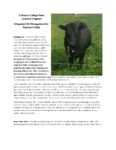
Integrated Fly Management for Pastured Cattle
In grazing systems, flies can not only be a nuisance for cattle but can also cause herd health problems like pink eye, and reduce milk production and weight gain. Matt Steiman, livestock manager at Dickinson College Farm worked with Dr. Jason Smith, entomologist and horticultural specialist at Milton Hershey School to develop this fact sheet […]

Cornell Soil Health Assessment
The Cornell soil health assessment was created to help farmers develop appropriate management solutions to build healthy soils. Focusing on soil health helps improve productivity, reduces the need for external inputs, and increases a farm's resilience to extreme weather events.
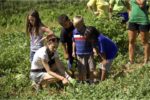
Vermont Food Education Every Day
Includes guides for farmers and food service personnel working to increase local food in schools.
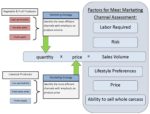
Livestock Marketing Channel Assessment Tool
This tool provides livestock producers with a way to identify the most profitable marketing channels.
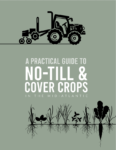
A Practical Guide to No-Till and Cover Crops in the Mid-Atlantic
No-till and cover crops are among the most cost effective tools to reverse soil and carbon loss and improve soil health; the economic, agronomic and environmental benefits of these practices are well known within the farming community. Transitioning from conventional farming to no-till, and incorporating the use of cover crops, requires a higher level of […]
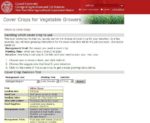
New York Cover Crops Decision Tool
This is an online tool to help you quickly narrow the choices of cover crop for your situation. In a few seconds, you will have growing instructions for the cover crop that will do the job you need. Access the Cover Crops Decision Tool now. It is designed for the soil, climate, cropping practices and […]
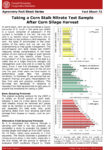
Nutrient Management in Corn Production
The following Cornell University agronomy fact sheets were developed during a 2009 SARE grant to help farmers and educators better evaluate nutrient cycling in corn production, thereby equipping them with information to make improved whole-farm management decisions: Illinois Soil Nitrogen Test for Corn, fact sheet 36 Fine-Tuning Nitrogen Use on Corn, fact sheet 63 Adaptive […]

Crediting Cover Crops and Soil Organic Matter in a Variable Rate Nitrogen Fertilizer Prescription
Crop growth depends on available nitrogen (N) in the soil, much of which comes from mineralization of soil organic matter and other organic residues, such as cover crops. The amount of mineralized N available to a crop depends on several biological and environmental factors such as temperature, moisture, soil texture, the total quantity of organic […]
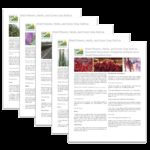
Dried Flowers, Herbs and Cover Crops Sold as Seasonal Decoration
Monica Drazba of Chickadee Creek Farm in Pennington, New Jersey conducted a Northeast SARE Farmer Grant to study the production costs, required labor, marketability, and profitability of growing specialty cut flowers and grasses specifically for wreath production. As a result, she created a series of five fact sheets, below, that contain an analysis of the […]
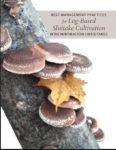
Log-Based Shiitake Cultivation
A 57-page guide to producing these gourmet mushrooms.
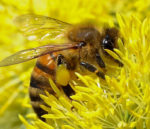
Native bees and flowering cover crops
While managed colonies of European honey bees are most frequently used for crop pollination, wild or native bees commonly provide the same pollination services for ‘free’ without the costs of renting or maintaining honey bee hives.
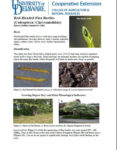
Control of Red-Headed Flea Beetles
Red-headed flea beetles have a wide host range including chrysanthemums, forsythia, hibiscus, lamb’s-quarter, pigweed, zinnia, sedum, asters, Salvia, roses, hollies among many others.
Assessing the Economic Impacts of Regional Food Hubs: the Case of Regional Access
This report assesses the economic impact of food hubs on the distribution and sale of local foods.

The Baltimore Farm Alliance
Lessons learned while building a farm alliance in Baltimore, MD.

Small-scale Oilseed Processing Guide
Oilseed crops present an opportunity for farmers in the Northeast to diversify with a crop typically grown in the Midwestern and Great Plains regions. Many of the crops are adaptable and have been grown in the Northeast--some for a number of years, and others only recently.
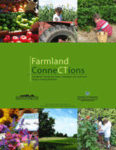
Farmland ConneCTions
A guide for towns, institutions, and land trusts using or leasing farmland.

Buckwheat Cover Crop Handbook
Buckwheat has been used to suppress weeds on Northeastern farms for 400 years. This handbook outlines how to use buckwheat as an economical weed-control tool, with recommendations based on extensive grower surveys, original research and on-farm trials.